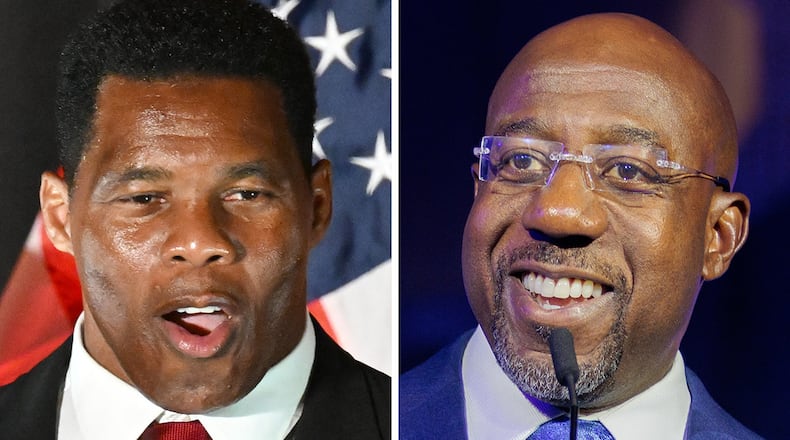On a chilly Saturday afternoon, U.S. Sen. Raphael Warnock’s campaign bus rolled into a park in Cumming, deep in the heart of Forsyth County. Nearly two-thirds of voters in this reliably Republican exurb backed Warnock’s opponent, Herschel Walker, in the general election.
But with a Senate runoff just weeks away, Warnock was ceding no ground.
“Clearly, I’m serious about working with everybody, I came to Cumming,” he quipped to the Democratic faithful who had turned up to see him in hats and scarves.
That same day, Walker was just up the road in Cobb County. Once a GOP bastion, Cobb has, in recent years, been solidly Democratic. In this year’s general election, about 57% of Cobb voters cast a ballot for Warnock.
But the rally with Brian Kemp underscored the kind of voter Walker is hoping to get back out for the runoff, suburban residents who supported the governor’s reelection.
“We need someone in Washington that’s going to row the boat with Gov. Kemp. And we’ve got to row in the same direction,” Walker told a crowd of hundreds who had gathered outside a Smyrna gun store.
Conventional wisdom holds that runoffs are all about turnout: The candidate who gets their people back out to the polls wins. But following a race where the candidates were separated by a whisper-thin margin of less than 1 percentage point, every voter really does count. And that has meant campaigning in some unlikely places as the runoff sprints into the homestretch.
‘There are Democrats here in this county’
Voter-rich metro Atlanta remains the core base of support for Democrats. In the Nov. 8 general election, Warnock pulled about half of his 1.9 million votes from five counties — Clayton, Cobb, DeKalb, Fulton and Gwinnett. But building on Democrat Stacey Abrams’ blueprint in 2018, he has also contested areas that have been Republican strongholds.
Warnock won’t win Forsyth County — or many of the other exurban and rural areas he has visited — but cutting into the margins there can be the difference between winning and losing a statewide election in a swing state such as Georgia. On the three days before Thanksgiving Warnock made seven campaign stops, and all but two of them were in counties he lost to Walker.
“As senator, I represent the whole state, and I’m committed to doing that work,” Warnock told reporters following the event in Forsyth County. “We need to get past blue and red in this country and in this state.”
In some rural areas, Warnock is tapping into large pockets of Black voters who have either been ignored or simply felt their votes didn’t matter.
Alvin Darrisaw was one of them. Excited to see Warnock speak in Johnson County on Monday night, Darrisaw said it was the first time he’d been to a political event.
“We don’t get a lot of visits down here,” Darrisaw said. “We’re pretty small, and people don’t pay much attention to us.”
Patty Hewett said the same had been true in Bryan County, south of Savannah. When she and other like-minded residents began waving signs at a corner on U.S. 17 a few years ago the reaction from some was surprise.
“People said, ‘Oh gosh, look there are Democrats here in this county,’ ” she said.
Since then, Warnock and fellow Democratic U.S. Jon Ossoff have been repeat visitors in Bryan County, and that, she said, helps Democrats there reach more people.
Has it mattered?
In this year’s general election, Warnock beat Abrams’ vote tally from the 2018 midterm elections in Bryan by a little more than 1,000 votes. That may not seem like much, but consider the fact that Georgia has 159 counties and you begin to see the difference that can make.
Split-ticket voters
Walker, meanwhile, has embraced Kemp, a Republican he barely mentioned during the general election, in a bid to get the popular governor’s supporters back out. In addition to their joint appearance in Cobb, Republicans are also saturating the airwaves with an ad for Walker featuring a testimonial from the governor.
“Herschel Walker will vote for Georgia, not be another rubber stamp for Joe Biden,” Kemp says in the spot paid for by the National Republican Senatorial Committee.
Kemp coasted to reelection along with the rest of the statewide Republican ticket, and he won about 200,000 more votes than Walker. The former football star is in a runoff because some Georgians split their tickets.
Credit: TNS
Credit: TNS
In Cobb, for instance, Kemp won roughly 20,000 more votes than Walker, and in Fulton the difference was a little more than 25,000 votes. If Walker had simply matched Kemp in those two counties alone he would have more than made up the 37,675 vote difference with Warnock.
In the week before the election, Walker traveled from the mountains of North Georgia to the farmlands of the southern part of the state. Since Nov. 8, Walker has made a pair of appearances in Cobb and another in Milton, located in north Fulton.
Jill Weaver represents the kind of voter Walker needs. She supported Kemp and Walker in the general election but was more excited about Kemp. Still, she said she will vote again.
“I know some people didn’t vote for him, but I say ‘why not?’ ” Weaver said at a Walker event in Powder Springs. “No one’s perfect, and I think you need to do anything to stop the Democrat Party or or at least slow them down.”
About the Author
Keep Reading
The Latest
Featured







